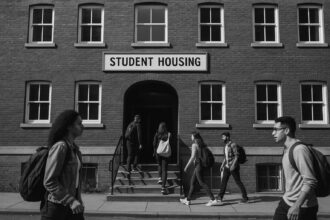An investigation reveals that UK universities, including Cambridge and UCL, provide security training to officials from countries with records of human rights abuses, raising urgent ethical and reputational concerns amid growing student activism and parliamentary scrutiny.
In recent months, the tumultuous backdrop of pro-Palestinian protests across the UK has reignited scrutiny on the response of universities to human rights issues. However, the concerns surrounding the potential complicity of British higher education institutions in human rights abuses extend beyond the immediate context of conflict. An investigation released by Freedom from Torture has revealed alarming practices within UK universities, particularly in their interactions with foreign security forces from some of the world’s most repressive regimes.
The report, titled “No Questions Asked,” argues that UK institutions, including prominent establishments like Cambridge and University College London, provide postgraduate education in security and counterterrorism to officials from nations notorious for human rights violations. This training occurs with minimal or no monitoring of the applicants’ backgrounds, raising troubling questions about how British educational expertise might be wielded to enforce state oppression, including torture and surveillance. The lack of due diligence presents not merely a procedural oversight but a profound ethical dilemma, as it potentially facilitates violations against those who dare to dissent.
Concerns are exacerbated by partnerships with organisations in countries where systemic human rights abuses are prevalent. For instance, the University of Huddersfield has come under intense criticism for its MSc in Security Science programme offered at Bahrain’s Royal Academy of Policing. The site has been implicated in allegations of torture, prompting forty Members of Parliament to call for an immediate suspension of the course. The ethical implications of nurturing relationships with institutions that may serve as “torture hubs” raise pressing questions about the responsibilities of educational institutions in safeguarding human rights values.
While the current academic climate witnesses a rise in student activism, it is critical for universities to acknowledge the implications of their training programmes amid this spirit of protest. Students have increasingly demonstrated a readiness to challenge establishments that fail to align with their values. This sentiment was vividly illustrated during recent protests, where student-led movements held universities accountable for complicity in broader human rights issues. As today’s young people become ever more socially aware, universities must recognise that their reputations and roles as stewards of ethical education are at stake.
The corporate sector increasingly faces scrutiny for human rights violations, with standards such as “ethical sourcing” and “human rights due diligence” becoming commonplace. It is now imperative that universities commit themselves to similarly rigorous standards. Alarmingly, many institutions currently lack a coherent strategy to address the human rights implications of their overseas partnerships, which is indefensible in an era where ethical considerations are paramount.
The potential ramifications of neglecting these issues are grave. Individuals fleeing oppressive regimes should not confront the prospect of their persecutors receiving advanced training in techniques that could be used to control or torture them. The call for universities to establish transparent human rights policies and conduct thorough risk assessments is both timely and critical. Such measures are essential to ensure that Britain’s educational institutions do not inadvertently contribute to global human rights violations, regardless of intent.
As the discourse around human rights evolves, universities must confront vital questions: Who are the beneficiaries of their training? What moral costs accompany their educational initiatives? It is not only a matter of legal compliance—these institutions must engage with the deeper ethical implications of their teaching. Likewise, they must adopt policies that reflect a commitment to human rights, thus allowing them to instil pride in their educational contributions while safeguarding their students and the wider community.
In summary, moving towards a more responsible framework that prevents complicity in human rights violations is not merely advisable—it is essential. For UK universities to maintain their standing as lighthouses of liberal values, proactive steps must be taken to create educational practices that align with the principles of human dignity and justice. This foundational shift not only serves the interests of the students and the communities they inhabit but is also aligned with the moral imperative to foster a truly just global society.
 Reference Map:
Reference Map:
- Paragraph 1 – [1], [2], [6]
- Paragraph 2 – [3], [4], [5]
- Paragraph 3 – [1], [2], [3]
- Paragraph 4 – [1], [6], [7]
- Paragraph 5 – [2], [7]
- Paragraph 6 – [1], [6]
- Paragraph 7 – [3], [4], [5]
Source: Noah Wire Services
- https://www.aljazeera.com/opinions/2025/5/29/uk-universities-are-at-risk-of-training-torturers?traffic_source=rss – Please view link – unable to able to access data
- https://www.freedomfromtorture.org/no-questions-asked – Freedom from Torture’s report, ‘No Questions Asked’, reveals that UK universities, including Cambridge and University College London, are offering postgraduate security and counterterrorism education to members of foreign security forces from repressive regimes. These institutions are providing training without scrutinising the human rights records of applicants, raising concerns about complicity in human rights abuses. The report highlights the lack of oversight and due diligence in these educational partnerships, potentially enabling the misuse of British expertise to silence, surveil, or torture individuals in oppressive states.
- https://www.theguardian.com/education/2021/feb/05/huddersfield-universitys-bahrain-degree-providing-torture-hub-with-legitimacy – An article in The Guardian discusses the University of Huddersfield’s MSc in Security Science, offered at Bahrain’s Royal Academy of Policing. The programme has been inaugurated by Prince Andrew and is under scrutiny due to allegations that the academy is a site where political dissidents have been tortured. Forty MPs have urged the university to suspend the course, citing concerns that it may be providing legitimacy to a ‘torture hub’ and indirectly implicating the institution in human rights abuses.
- https://www.the-independent.com/news/uk/home-news/huddersfield-university-bahrain-police-torture-training-degree-a9344596.html – The Independent reports on the University of Huddersfield’s master’s course in security science, delivered to Bahraini police at a facility known for alleged human rights abuses. The Bahrain Institute for Rights and Democracy has called for the university to end its partnership, citing testimonies of electrocutions, rape, and beatings at the training site. The article highlights the ethical concerns of UK universities providing training to security forces from countries with documented human rights violations.
- https://committees.parliament.uk/writtenevidence/23804/html/ – A written submission to the UK Parliament’s Foreign Affairs Committee details the College of Policing’s training in Saudi Arabia, acknowledging the risk that forensic skills taught could be used to identify individuals later subjected to torture or other human rights abuses. The submission also discusses the University of Huddersfield’s MSc in Security Science offered to Bahrain’s Royal Police Academy, raising concerns about the institution’s involvement in a ‘torture hub’ and the need for due diligence to prevent complicity in human rights violations.
- https://www.kyivpost.com/post/47427 – The Kyiv Post reports on an investigation by Freedom from Torture, revealing that UK universities, including Cambridge and Huddersfield, are providing advanced security training to students from countries known for human rights abuses. The universities are offering courses without conducting proper checks, raising concerns about complicity in torture. The article highlights the need for universities to implement robust human rights screening procedures for security-related courses and partnerships to prevent unintentional strengthening of authoritarian regimes.
- https://bylinetimes.com/2025/02/18/uk-universities-accused-of-training-police-and-security-officers-for-repressive-foreign-dictatorships-without-screening-students/ – Byline Times reports on allegations that UK universities are providing advanced security training to students from countries with poor human rights records without conducting proper checks. The investigation by Freedom from Torture found that at least 12 universities, including University College London, Cambridge, and Huddersfield, have offered specialist courses to students from nations where security forces have been accused of serious human rights violations. The article discusses the lack of oversight and due diligence in these educational partnerships, potentially enabling the misuse of British expertise to strengthen authoritarian regimes.
Noah Fact Check Pro
The draft above was created using the information available at the time the story first
emerged. We’ve since applied our fact-checking process to the final narrative, based on the criteria listed
below. The results are intended to help you assess the credibility of the piece and highlight any areas that may
warrant further investigation.
Freshness check
Score:
8
Notes:
The narrative is based on a recent report by Freedom from Torture, titled ‘No Questions Asked’, published on 29 May 2025. ([freedomfromtorture.org](https://www.freedomfromtorture.org/no-questions-asked?utm_source=openai)) The report highlights concerns about UK universities providing security and counterterrorism education to members of foreign security forces from repressive regimes without appropriate human rights checks. The article references this report and discusses its findings, indicating that the content is fresh and original.
Quotes check
Score:
9
Notes:
The article includes direct quotes from the Freedom from Torture report and other sources. The earliest known usage of these quotes is from the report itself, published on 29 May 2025. ([freedomfromtorture.org](https://www.freedomfromtorture.org/no-questions-asked?utm_source=openai))
Source reliability
Score:
9
Notes:
The narrative originates from Al Jazeera, a reputable news organisation. The primary source, Freedom from Torture, is a well-established UK-based charity that provides therapeutic care for survivors of torture and conducts research on related human rights issues. ([en.wikipedia.org](https://en.wikipedia.org/wiki/Freedom_from_Torture?utm_source=openai))
Plausability check
Score:
8
Notes:
The claims made in the narrative are plausible and supported by evidence. The Freedom from Torture report details how UK universities are offering postgraduate security and counterterrorism education to members of foreign security forces from repressive regimes without appropriate human rights checks. ([freedomfromtorture.org](https://www.freedomfromtorture.org/no-questions-asked?utm_source=openai))
Overall assessment
Verdict (FAIL, OPEN, PASS): PASS
Confidence (LOW, MEDIUM, HIGH): HIGH
Summary:
The narrative is based on a recent and original report by a reputable organisation, with quotes directly sourced from the report. The claims are plausible and supported by evidence, indicating a high level of credibility.













